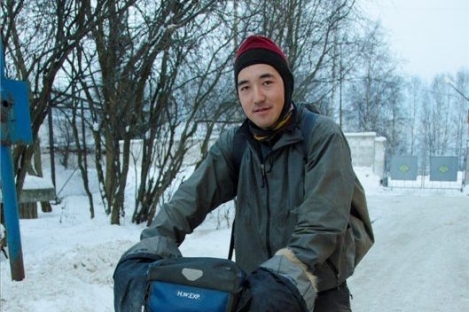
Famous Japanese traveler Haruhisa Watanabe has been killed in a traffic accident in the Murmansk region. Source: Press Photo
The renowned Japanese adventurer known in Russia as the “Japanese Fyodor Konyukhov,” Haruhisa Watanabe, is believed to have been killed on Wednesday, Dec. 26. He is reported to have been preparing to undertake a bicycle tour of the CIS
“On December 26, 2012, on the 1128th kilometer of the federal M18 road Kola, a Subaru Impreza heading from St. Petersburg to Murmansk caused a road traffic accident, hitting a cyclist moving in the same direction. The biker, a Japanese citizen born in 1981, died at the scene from the injuries sustained as a result of the accident. The driver of the Subaru Impreza, a man born in 1956, has over 30 years driving experience and was sober at the time of the accident.
“The police have launched an investigation,” the press office of the Ministry of Internal Affairs for the Murmansk region said.
“Immediately after the accident, the driver called an ambulance and the road traffic police in an effort to help the Japanese traveller. He made no attempt to flee the scene.
“Police and medical assistance arrived in 20 minutes. Unfortunately, Watanabe died at the scene. According to the information we have, his body has been taken to the morgue at the local hospital in the town of Zelenoborsk,” the statement from the press office continued.
The Murmansk regional department of the Ministry of Foreign Affairs has notified the Consulate General of Japan in St Petersburg about the tragic accident.
Watanabe is famous for setting several national records and was very close to getting his name in the “Guinness Book of Records.” He set a record for the fastest downhill ride from Mount Fuji, climbed the highest mountain peaks on seven continents and spent six months completing the fastest cycling tour around Tibet. Watanabe was not chained to his bicycle, though; he also traveled on foot. The total mileage of his trips had long since exceeded the circumference of the Earth.
This tragic accident brings to mind yet another tragic event, when a different Japanese traveler, Koichi Onita, was violently murdered in Russia’s Transbaikal in May 2012. Investigators revealed that the traveler was stabbed almost 30 times by two local unemployed men who wanted to take his motorcycle.
The Japanese biker – an amateur photographer – was in the middle of his motorcycle tour from Japan to Qatar. He crossed the Russian border on May 14, in Vladivostok.
“We immediately suspected the crime was committed by someone local. We followed up on the assumption and found the suspects,” said Yegor Markov, senior aide to the chief mass-media relations officer of the Transbaikal department of the Investigative Committee.
“One of the suspects, aged 20, who had a prior conviction for robbery, has already confessed. According to the suspect, they took a dirt track from the federal Irkutsk-Chita highway to the village of Zhipkhegen on the evening of May 21 and saw a tent pitched right in one of the lanes. They passed the tent and introduced themselves to the tourist. When they realized he was a foreigner and saw his expensive bike, they decided to kill him and take his vehicle.”
Naturally enough, such tragic accidents do not help make the country a more attractive tourist destination and even compromise its image in the face of the upcoming 2014 Winter Olympics and the 2018 FIFA World Cup. It would have been a little easier had it only been the disastrous road traffic accident, but the ruthless murder of Onita is downright barbarous.
First published in Russian in Gazeta.ru.
All rights reserved by Rossiyskaya Gazeta.
Subscribe
to our newsletter!
Get the week's best stories straight to your inbox